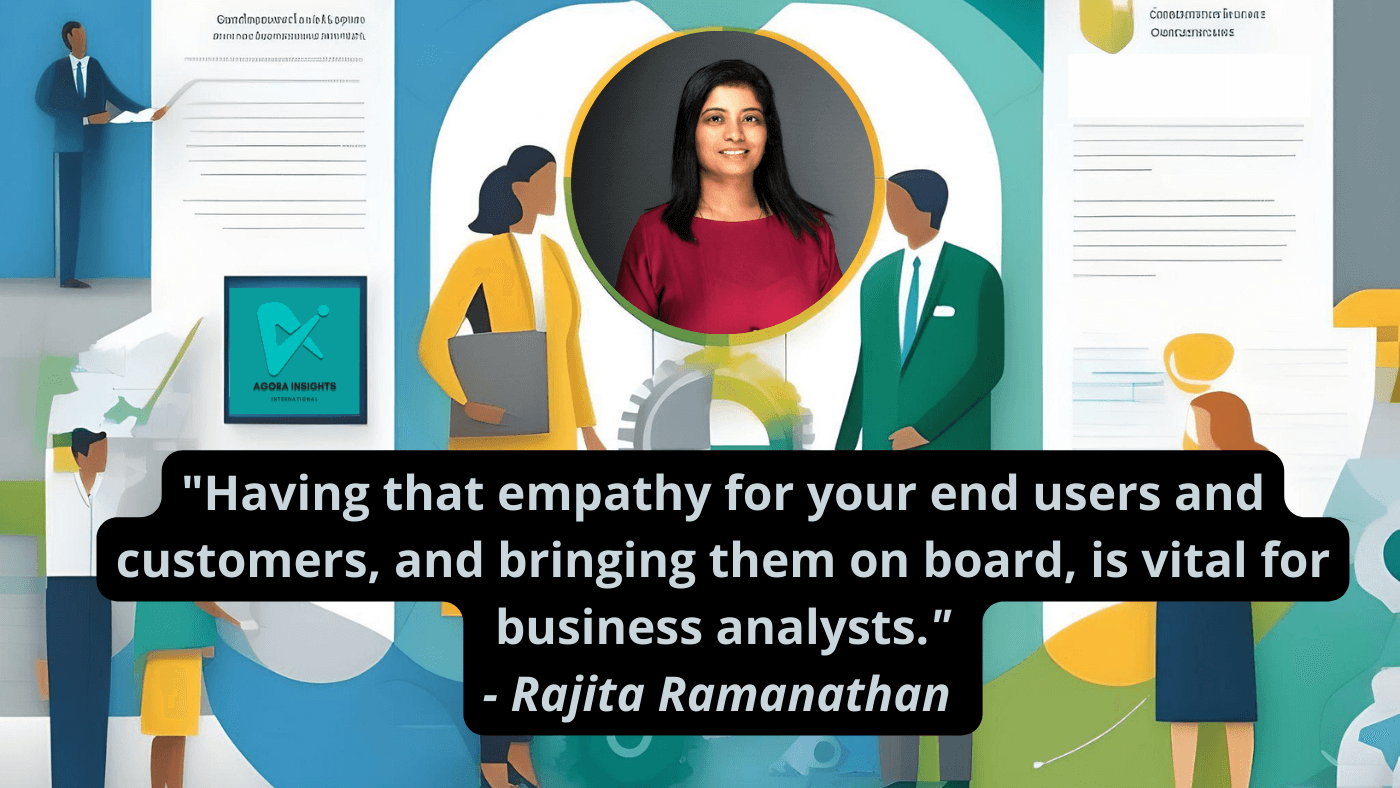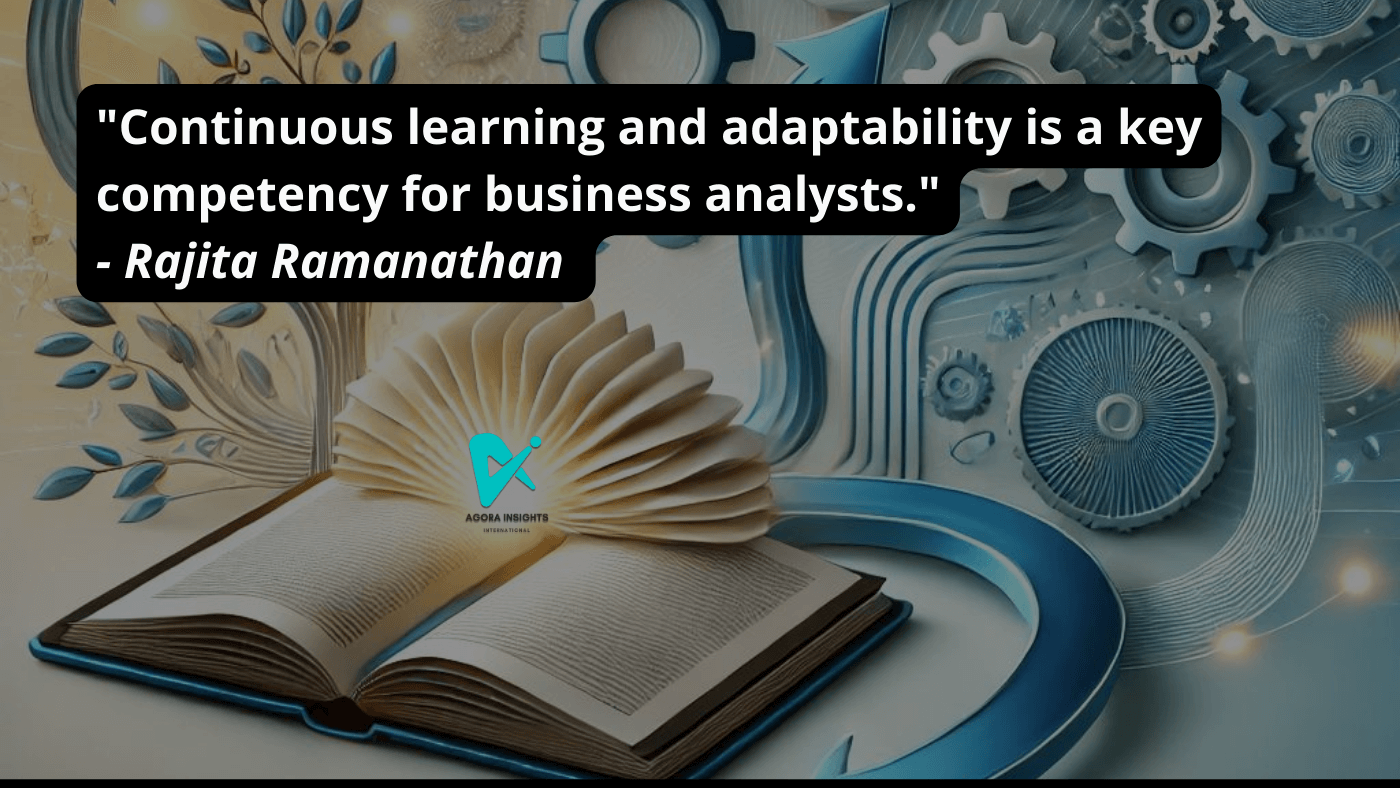 Hosted by Deirdre Caren on Agora Insights' Blueprints for Success: Business Analysis Beyond Business Requirements, Collaboration with Stakeholder Empathy and Continuous Learning.
Hosted by Deirdre Caren on Agora Insights' Blueprints for Success: Business Analysis Beyond Business Requirements, Collaboration with Stakeholder Empathy and Continuous Learning.
Introduction
Recently, I had a thought-provoking conversation with Rajita Ramanathan, a dedicated professional in the field of business analysis in Dubai. Her passion for growing the profession, both in organizations and in the UAE, is inspiring. Rajita also shares her desire to start an IIBA chapter in the region.
Our discussion centered around the necessity to move beyond traditional requirements gathering. We had a closer look at the importance of collaboration and problem-solving grounded in stakeholder empathy and continuous learning to address business needs.
Let’s get started…
Background
Rajita brings over 20 years of diverse experience in business analysis across industries such as health insurance, airlines, banking, and e-government services. Her foundational skills were developed in structured organizations, equipping her with best practices that she applies in various environments. This extensive background gives her a unique perspective on organizational dynamics and the critical role of effective business analysis.
Recently, Rajita shared a story about optimising the pilot rostering system. She led focus groups to identify key stakeholders and gather insights, emphasizing that "a well-defined problem is the foundation" for effective solutions. Through collaborative discussions, she discovered that the challenges stemmed from business rules rather than just the application itself. By reworking these rules and running simulations, Rajita's team achieved improved outcomes without additional costs or implementation efforts. This project highlights the transformative power of business analysis in driving organizational change and improvement. Rajita is also dedicated to mentoring and is actively establishing a business analysis chapter in the Middle East to promote community and professional growth.

Key Topics Discussed
1. Moving Beyond Traditional Requirements Gathering
Rajita highlighted the importance of shifting from merely collecting requirements to a more comprehensive understanding of business challenges. This transition is not just about documenting what stakeholders say; it involves engaging with them to uncover the real issues affecting the organization. By facilitating open discussions, business analysts can identify root causes rather than just addressing symptoms.
This approach enhances the quality of analysis and ensures that the solutions developed genuinely meet business needs. It empowers analysts to act as problem solvers, guiding organizations toward effective solutions that align with their strategic goals. For instance, in a project Rajita worked on in the airline industry, she emphasized the need to engage various stakeholders to redefine business rules rather than simply implementing a new system. This focus on understanding the underlying problems led to more effective and sustainable solutions.
2. Collaboration and Stakeholder Empathy
Collaboration is essential in business analysis, and Rajita stressed that effective analysis is fundamentally about people. Building strong relationships with stakeholders allows analysts to gain insights into their perspectives and concerns, fostering an environment of trust and open communication. This empathetic approach is crucial for facilitating discussions that bring together diverse viewpoints, ultimately leading to well-informed decisions.
By encouraging collaboration across departments, business analysts can drive innovation and enhance the quality of outcomes. Rajita shared an example from her experience, where engaging stakeholders from various functions led to a more comprehensive understanding of the issues at hand. This collaborative mindset not only improves problem-solving but also strengthens the overall impact of business analysis within an organization.
3. Continuous Learning and Adaptability
The fast pace of technological change, especially with the rise of AI and digital transformation, necessitates that business analysts commit to continuous learning. Rajita emphasized the need to stay updated with industry trends and acquire new skills that extend beyond traditional business analysis. This includes understanding areas such as cybersecurity, compliance, and agile methodologies.
By adopting a mindset of curiosity and adaptability, business analysts can position themselves as valuable contributors to their organizations. They become equipped to tackle emerging challenges and leverage new opportunities. Rajita pointed out that professionals should actively seek out opportunities to implement their learning and drive change, rather than waiting for projects to come to them. This proactive approach is essential to get ahead in one's career.
Key Learning Points
- Business analysis should evolve from traditional requirements gathering to a comprehensive understanding of business problems.
- Engaging stakeholders in meaningful discussions is essential for accurately defining issues.
- Empathy for stakeholders enhances collaboration and leads to better solutions.
- Business analysts need to cultivate strong relationships to facilitate effective communication and decision-making.
- Continuous learning is vital to keep pace with technological advancements and industry trends.
- A holistic approach to problem-solving can uncover root causes rather than surface-level symptoms.
- Understanding the broader business context helps analysts align solutions with organizational goals.
- Collaboration across departments fosters innovation and enhances the quality of outcomes.
- Business analysts should take on a strategic role, contributing to organizational change rather than being confined to IT projects.
- Networking and community engagement can provide valuable resources and support for professional growth.
Conclusion
My conversation with Rajita underscored the importance of moving beyond traditional practices in business analysis to address the complex challenges organizations face today. By fostering collaboration, cultivating empathy, and committing to continuous learning, business analysts can play a pivotal role in driving meaningful change within their organizations.
At Agora Insights, we believe in the power of knowledge sharing and community building. If you're interested in further exploring business architecture, business analysis certification, or AI training, I encourage you to reach out. Together, we can navigate the evolving landscape of business analysis and equip ourselves with the skills needed to succeed.
Feel free to share in our Blueprints for Success Podcast or comment with any questions!

To get weekly videos and interviews from leaders around the world, subscribe to our Blueprints for Success Newsletter on LinkedIn
Just a reminder that Agora Insights and now Aidon.ai open up a world of learning and AI-Assisted Solutions for Business Architects, Analysts, Strategists, and Business Leaders. Contact us for a demo.
To watch more videos, visit YouTube.
Interested in business architecture and business analysis certification, corporate and AI training? Go to our website www.agorainsights.com
Contact Deirdre Caren on LinkedIn
About Rajita
Rajita holds certifications as a Certified Business Analysis Professional (CBAP) and a Certified Scrum Professional (CSP). She collaborates with business stakeholders to prioritize IT initiatives, conduct cost-benefit analyses, and manage project scopes, timelines, and resources.
For more information, connect with her on LinkedIn
Post sponsored by Agora Insights Ltd


Post a Comment